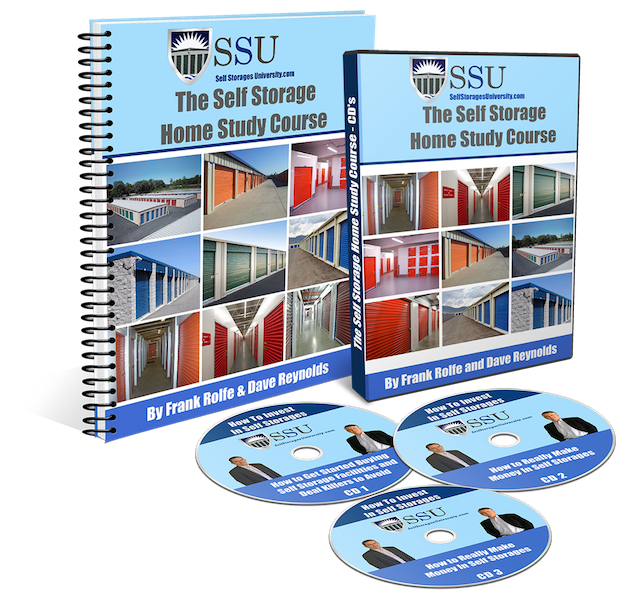Today is April Fool’s Day. Wikipedia defines a “fool” as “a person who acts unwisely or imprudently”. In the self-storage industry, the biggest “fool” is the one that conducts poor due diligence. Benjamin Franklin once said “diligence is the mother of good luck” which also means the antidote to being a “fool”. If you conduct proper diligence on a property, you will be able to ascertain the true net income it can derive from regular operations – which is not always the net income the broker or seller has been trying to convince you of. It’s amazing how many “great” deals turn into average or worse when you really put a microscope on the real revenue and expenses. Or even how many storage properties go from solid to quicksand when they fail the Phase I Environmental Report. So the message is this: let April 1st be a reminder to you that there is no substitute for good due diligence. Those who do it always succeed and those who don’t seldom do.
Memo From Frank & Dave
Price Can’t Fix Everything

Some self-storage facility buyers believe that they can fix virtually any problem by undercutting the competition. While it’s true that lowering your price can make the phone ring more, it’s hardly the solution to a host of problems that can preclude your investment from ever succeeding. So what are the things that price can’t fix?
Location
Real estate is all about location, location, location – and storage is no different. You have to be in a good market with good visibility from the street in a safe neighborhood that customers find desirable. It’s amazing how many buyers think that they can take a storage property in foreclosure due to lack of visibility or being on the wrong side of town and turn it around by dripping the price 20%. All you do is end up back in foreclosure again (and there have been a number of properties in the U.S. that have been foreclosed on several times). Without a winning location you are doomed. The only exception is if you can hold the property long enough – in a transitional neighborhood – that it becomes desirable again at some point in the future.
A declining market
When the population is running for the exits, it’s a good idea not to buy a storage property. Storage relies on humans to want to store their stuff, and declining populations mean that every day there is less demand for what you do. When you look at markets like Flint, Michigan, it’s a reminder that you can do everything right and still get crushed if the market falls out from under you. Instead, focus on the market dynamics by visiting websites like www.bestplaces.net. Stay away from huge declines in populations or housing values.
Deferred maintenance
Nobody is going to store their stuff in a facility where the roofs leak or there is standing water or giant potholes in the road. You can’t just say to the customer “hey, it’s no big deal, I’ll just the drop the rent by $10 per month”. There’s no successful “slumlord” business model with storage – nobody will show up. Facilities must be maintained or you will have no customers. And sometimes the cost of fixing that deferred maintenance creates a cap rate that is too low to be acceptable.
Conclusion
Price discounting is a popular trick in retail. But it doesn’t work that well in storage – at least not enough to mask over fatal flaws with the property.
Self Storage Home Study Course
Our Home Study Course is not like anything you have ever listened to or read before. We do not fill it with a bunch of fluff on how your are going to make a million bucks with no money down. We tell you the whole story... the good, the bad, and the sometimes ugly.
Click Here for more information.
The Importance Of Non-Recourse Debt

One great thing about storage investing is that banks are always interested because the industry has among the lowest rates of default of any real estate sector. But what about what you want in a bank? One of the most important features of any loan – for most borrowers – is that it be “non-recourse”. In fact, most institutional debt always has this quality. But what is it and why is it the best type of lending?
What is recourse debt?
Let’s start off with the opposite, the normal type of loan called “recourse”. In a “recourse” loan, if you default on the loan and the property is sold at a loss, you have to personally pay the bank back for whatever the deficiency was. That’s a huge amount of risk. It’s one thing to lose your down payment, but something entirely different if you have to come out of pocket with even more money after you lost the property.
What is non-recourse debt?
Then there’s “non-recourse” debt, the better alternative. With “non-recourse” lending, the borrower cannot lose anything other than just their down payment as the worst case scenario – no matter what happens. The bank could lose $5 million and they can’t come after you for even $5. You have complete peace of mind.
Other benefits of non-recourse debt
Besides protecting your financial security, non-recourse debt has another strong power: the power of renegotiating your debt. Since the bank can’t cover it’s loss if the property is sold at a loss, it has very little interest in having that occur. Non-recourse loans can frequently be renegotiated and extended since the lender really does not want to take them back. Recourse debt, on the other hand, encourages the lender to foreclose with the banker thinking he’ll just get you to cover the loss so why wait?
How do you get it?
Non-recourse debt is always the norm with seller financing and CMBS “conduit” debt. But you can even get it with small-town banks who claim that they never offer it. Here’s how you get it. As them “do you offer non-recourse debt?” and they’ll say “no”. Then say “what if I put 50% down” and they’ll say “sure, we’d do that non-recourse”. Then say “well, since you really do non-recourse debt, what amount down to I have to put to get non-recourse?”. The answer is normally 30% to 40% down. If you can afford that, it might give you much greater inner serenity to have no risk.
Conclusion
Non-recourse debt is great. These points will get you off on the right foot. If you can obtain it, it’s well worth the effort.
How M.J. Vukovich Can Get You A Cash-Out Loan
Conduit debt (also known as CMBS debt) is a special product that offers 70% LTV on appraised value – regardless of what you paid for the storage facility. This means that if you have created value through greater net income, then you will be rewarded at refinancing with a higher valuation and, potentially, a “cash-out” situation. This means that you will effectively get all your down payment back from the original purchase, plus additional cash out based on the new effective value. And this “cash out” is tax free since it’s effectively a loan. In addition, these conduit loans are non-recourse and feature low, fixed interest rates and long loan terms. But how do you get one? If your deal is over $1 million, then the answer is using a loan broker, and the best in the business is M.J. Vukovich at Bellwether Capital. We’ve been using him for years and he essentially creates the loan request, meets with the lenders, helps you in the selection, negotiate the final terms and shepherds the deal to closing. In exchange he gets a small commission that is a bargain for the amount of time and expertise rendered. For more information call him at (612) 335-7740 or email him at [email protected]. You’ll be glad you did.
Don’t Mistake Age For Wisdom In The Self-Storage Industry

You’ve been in this situation: the older seller wants to give you sage advice as to how to properly operate their storage property, or what you should and shouldn’t buy. Should you listen to this wisdom or is the information flawed?
There was easy money in the 1970s and 80s
When you go to storage conventions, you’ll always notice these old timers who want to tell stories of how they built a metal building in a farm field and sold it to Public Storage for $10 million two decades later. That’s pretty much how the industry began when it transitioned from a goofy new concept to institutional ownership by public companies. As a result, some of the older owners were simply lucky and not that strategic.
Many storage facilities are poorly operated by moms and pops
There are many great people who lack good business models. They have been doing things the same way for decades and the ideas may no longer be relevant. The biggest fault with some of these owners is their lack of embracing the internet era, with no Google search visibility, on-line advertising or website. So sometimes the storage owner may be very well-intentioned but the information is flawed.
You have to look at the source when getting advice
The bottom line is that you should always ask yourself when you receive any information “what’s the quality of the source”. If a banker tell you how to produce your loan package that’s infinitely better information than a storage owner that has not applied for a loan since 1974, Always be cordial with any storage owner or anyone who wants to give you advice, but don’t take action on that information unless you’ve vetted the source.
Conclusion
There are a lot of good people in this industry with a lot of ideas. You just need to separate the best from the average and discount the ones that are not actually valid.
Brought To You By SelfStoragesUniversity.com
If you need more information please call us (855) 879-2738 or Email [email protected]
